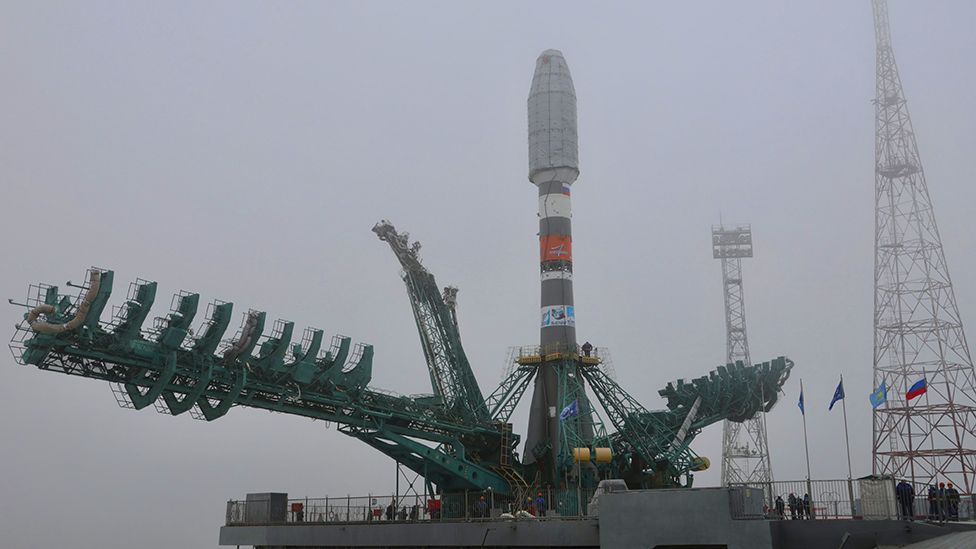OneWeb: UK satellite firm suspends use of Russian rockets
- Published

OneWeb, the satellite company part-owned by the UK government, says it is suspending all launches from the Russian-operated Baikonur spaceport.
The firm had hoped to send up 36 spacecraft on a Soyuz rocket from the Kazakhstan cosmodrome, but the mission has become embroiled in the fall-out over the invasion of Ukraine.
Russia put down demands ahead of the flight that OneWeb could not meet.
These included a guarantee that armed forces wouldn't use the satellites.
Russia also wanted the UK government to divest itself of OneWeb shares, an ultimatum that was firmly rejected by Business Secretary Kwasi Kwarteng.
Allow Twitter content?
This article contains content provided by Twitter. We ask for your permission before anything is loaded, as they may be using cookies and other technologies. You may want to read Twitter’s cookie policy, external and privacy policy, external before accepting. To view this content choose ‘accept and continue’.
The board of OneWeb, which is headquartered in west London, voted on Thursday morning to suspend all future launches from Baikonur. It had been planning a series of flights from the cosmodrome this year to complete its broadband internet constellation in the sky.
The firm will now be working with its French partner Arianespace, which organises Soyuz launches around the world, to find alternative rocket rides.
This will be difficult, however. There is a dearth of available vehicles in the class needed by OneWeb.
The company currently has 428 spacecraft in orbit. This is sufficient to provide space-borne internet connections above 50 degrees North (which includes the UK), but close to 650 satellites are required to run a truly global service.
After OneWeb's announcement, Mr Kwarteng, whose department has a seat on the board, followed up with his own comments, tweeting: "In light of Russia's illegal and unprovoked invasion of Ukraine, we are reviewing our participation in all further projects involving Russian collaboration."
This would appear to bring an end to the "will it, won't" confusion over whether the Soyuz rocket standing on the pad at Baikonur would actually launch on Friday.
Allow Twitter content?
This article contains content provided by Twitter. We ask for your permission before anything is loaded, as they may be using cookies and other technologies. You may want to read Twitter’s cookie policy, external and privacy policy, external before accepting. To view this content choose ‘accept and continue’.
Mr Rogozin posted a video of pad workers on Wednesday covering up UK, US and Japanese flags
When the vehicle, with 36 OneWeb satellites nestled under its nosecone, was rolled out by cosmodrome workers on Wednesday, it seemed that the flight was "go!".
But then the head of the Russian space agency Roscosmos, Dimitry Rogozin, started to make demands before he would give the flight approval. These demands, he said, were a response to western sanctions imposed on Russia because of the war in Ukraine.
First, he wanted assurances that OneWeb's system wouldn't be used for military purposes - an impossible ask given that UK and US forces are very keen to use the internet system. Then he wanted the "hostile" UK government to sell its shares in the company - instantly rebuffed by the business secretary.
Mr Rogozin ended by posting a video of pad workers covering up UK, US and Japanese flags on the rocket's nosecone.
Assuming Friday's planned launch is indeed cancelled, there arises the question of what happens to the 36 satellites.
These remain the property of OneWeb, but it's unclear how they could be returned. There are currently no OneWeb staff in Baikonur to organise a shipment, even if Russia agreed to release the spacecraft.
The company's manufacturing facility is in Florida where the production line can turn out two satellites a day, so they could quickly be replaced if alternative rockets are sourced.
Mr Rogozin has already stated that money received in exchange for Soyuz rockets will not be given back.
"Due to force majeure circumstances that have arisen as a result of the aggressive policy of the West and the sanctions that are applied against Russia, this money will remain in Russia," he said.